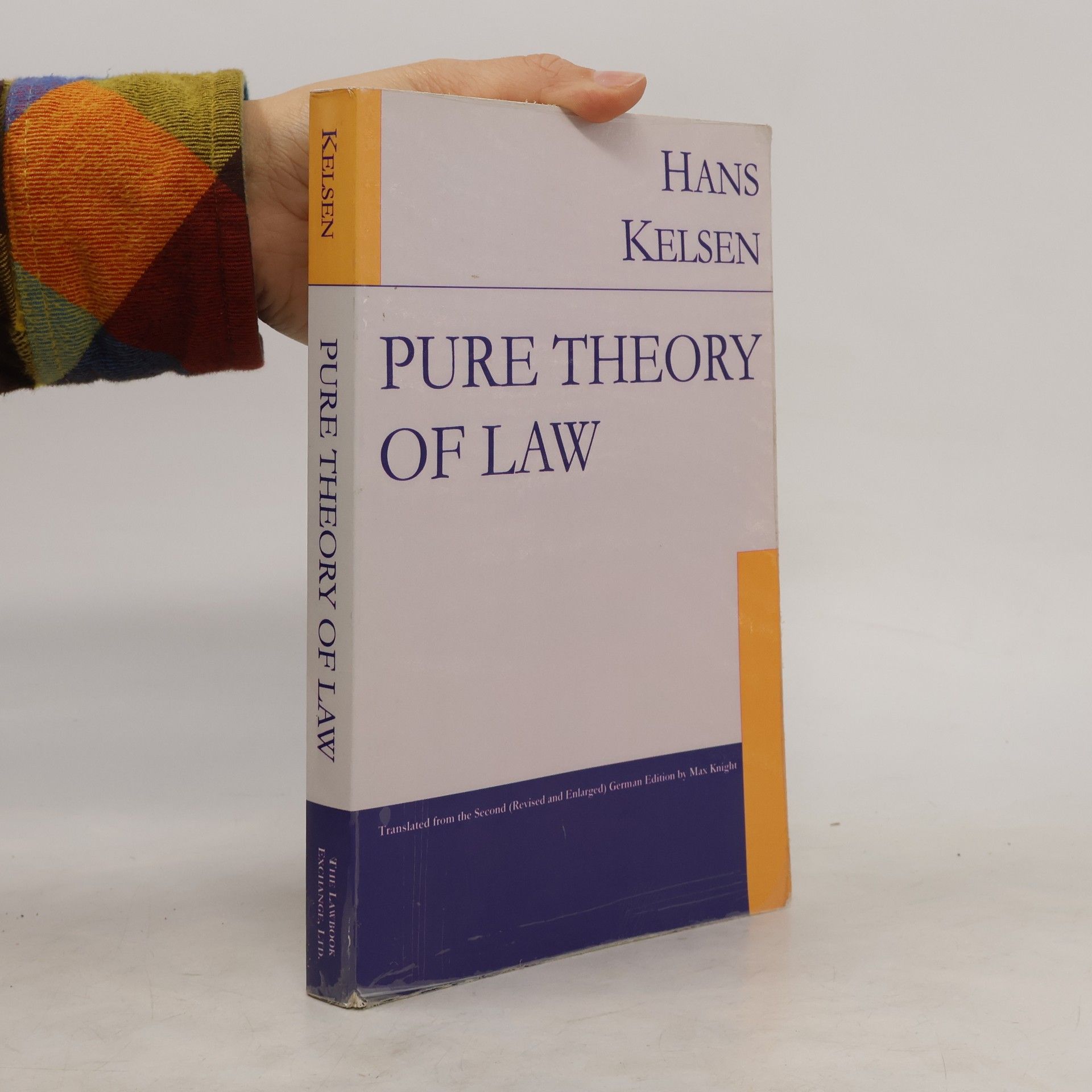Kelsens Schriften aus den Jahren 1922 und 1923 beleuchten seine kritische Haltung zu Marxismus, Sozialismus und Bolschewismus, während er gleichzeitig die Entwicklung der Wiener Schule der Rechtstheorie dokumentiert. Besonders hervorzuheben sind drei Beiträge, die sich mit seinem eigenen Kreis beschäftigen. In der Vorrede zur Zweitauflage seiner Hauptprobleme der Staatsrechtslehre reflektiert Kelsen über die Errungenschaften seiner Schülerinnen und Schüler. Gleichzeitig wird er von Fritz Sander, einem talentierten Schüler, herausgefordert, der ihm in persönlichen und sachlichen Aspekten widerspricht.
Hans Kelsen Book order (chronological)
Hans Kelsen was an influential jurist and philosopher whose work significantly shaped modern legal and political thought. Renowned for his "Pure Theory of Law," he was a staunch defender of democracy whose ideas extended across legal science, philosophy, and social theory. Kelsen's intellectual contributions profoundly impacted fields ranging from jurisprudence to international relations, establishing him as a leading thinker of his era. His rigorous approach and focus on legal positivism continue to be central to contemporary discussions on justice and governance.







Der Kommentar von Kelsen, Froehlich und Merkl bietet eine umfassende Analyse der Bundesverfassung der Ersten Republik Österreich, die 2020 ihren hundertsten Geburtstag feiert. Entstanden aus der engen Zusammenarbeit der Autoren während der Verfassungsberatungen, gilt er als Klassiker und Standardwerk. Kelsen, ein prominenter Verfassungsrechtler und Berater des Staatskanzlers, präsentiert hier die grundlegenden Verfassungsgesetze von 1920, die den Übergang zur bundesstaatlichen Verfassung regeln. Der Band schließt die Reihe der von Kelsen herausgegebenen Verfassungsgesetze ab und festigt seine Rolle in der jungen Republik.
Veröffentlichte Schriften 1920-1921
Band 6: Veröffentlichte Schriften 1920-1921
- 640 pages
- 23 hours of reading
In den Jahren 1920 und 1921 ist Hans Kelsen eine zentrale Figur der Wiener Rechtswissenschaft, agiert als Verfassungsberater und Mitglied des Verfassungsgerichtshofs. Trotz seiner zahlreichen Verpflichtungen zeigt er eine bemerkenswerte literarische Produktivität. Der Band dokumentiert seine vielfältigen Beiträge zu Themen wie der Verfassung der Ersten Republik, Demokratietheorie und Universitätspolitik. Besonders hervorzuheben sind drei Schriften: die einflussreiche Abhandlung zur Demokratie, eine Analyse des Verhältnisses von Staat und Recht sowie Kelsens erste umfassende Auseinandersetzung mit dem Marxismus.
Reine Rechtslehre
- 428 pages
- 15 hours of reading
Der Klassiker wird in einer modernen Aufmachung präsentiert, die sowohl alte Fans als auch neue Leser anspricht. Die zeitlose Handlung und die tiefgründigen Themen bleiben erhalten, während frische Illustrationen und ein ansprechendes Layout das Leseerlebnis bereichern. Diese Neuauflage bietet eine spannende Möglichkeit, die Geschichte neu zu entdecken und ihre Relevanz in der heutigen Zeit zu erkennen.
Allgemeine Staatslehre
Studienausgabe der Originalausgabe 1925
Mit seiner Allgemeine Staatslehre reiht sich Hans Kelsen in eine spezifisch deutschsprachige Tradition ein und begründet gleichzeitig etwas grundlegend Neues. Das Werk, Teil der „Enzyklopädie der Rechts- und Staatswissenschaft“, ist nicht nur der Auftakt zum Weimarer Richtungs- und Methodenstreit in der Staatsrechtslehre, sondern stellt auch die erste zusammenhängende Darstellung der von Kelsen entwickelten „Reinen Rechtslehre“ dar, neun Jahre vor der Erstauflage von 1934. Es zeigt Kelsen in der Blüte seines Wiener Schaffens und die „Jungösterreichische Schule der Rechtstheorie“ am Ende ihrer Formationsphase. Kelsen legt dar, dass die unter dem Begriff der Allgemeinen Staatslehre behandelten Fragestellungen durchgehend Probleme der Geltung und Erzeugung einer spezifischen Rechtsordnung sind. Er unterscheidet zwischen Geltungsfragen, die dem (Nomo-)Statisch zugeordnet sind, und Erzeugungsfragen, die den (Nomo-)Dynamik betreffen. Während frühere Arbeiten seine normativistisch-positivistische Lehre nur indirekt durch Dekonstruktion der traditionellen Staatsrechtslehre erahnen ließen, präsentiert Kelsen hier erstmals einen vollgültigen Gegenentwurf.
Čistá právna náuka
- 190 pages
- 7 hours of reading
Hans Kelsen bol významný rakúsky teoretik práva a politiky, zakladateľ tzv. normativizmu. Jeho Čistá právna náuka patrí medzi najdôležitejšie právno-filozofické diela 20. storočia. Ide o jeho opus magnum, ktorý sa rodil postupne počas celej jeho aktívnej kariéry. V tomto zásadnom texte sa rozchádza s prirodzenoprávnou náukou, s prienikom hodnôt, morálky a ideológie do právnej vedy. Tým, že chirurgickým rezom vylúpol právo od sociológie i morálky, objavil sa pred ním problém dôvodu platnosti práva. Keďže ním už nemôže byť autoritatívne určenie, sociálna účinnosť, ani voči právu vonkajší dôvod Rozum či Dobro , formuluje analytický dôvod platnosti: je ním základná norma, tento hypotetický predpoklad existencie každého právneho poriadku. Hans Kelsen po sebe zanechal mimoriadne rozsiahle dielo, jeho zásluhou sa formuje konzistentná a originálna analytická koncepcia právnej vedy čistá právna náuka.
Sobre la Jurisdicción Constitucional
- 349 pages
- 13 hours of reading
Resumen:La obra resalta algunos de los estudios de Hans Kelsen acompañados de artículos de juristas especializados en la temática constitucional, quienes reflexionan en torno a los ensayos del maestro vienés y establecen líneas complementarias valiosas para la investigación sobre la Jurisdicción Constitucional y la defensa de la constitucionalidad. Esta obra permitirá al lector conocer y profundizar más en la vasta obra de Hans Kelsen.
Dílo Hanse Kelsena (1881–1973) vzbuzovalo ve své době velkou odezvu nejen v německy mluvících zemích, ale i v Československu, a to zejména díky tzv. brněnské škole právní teorie. Její stoupenci v čele s prof. Františkem Weyrem Kelsenovy statě překládali a zpřístupňovali československé odborné veřejnosti. Kelsenovy myšlenky tak ovlivnily československou právní vědu a právem patří v našich zemích mezi klasická právnická díla. Předkládaná kniha je souborem všech Kelsenových děl, která v letech 1914–1938 vyšla v češtině, a to buď knižně, nebo časopisecky. Svazek obsahuje tyto statě: Sociologická a právnická idea státní (1914), Základy obecné teorie státní (1926), Problém parlamentarismu (1926), Juristický formalismus a ryzí nauka právní (1929), Ryzí nauka právní (1933), O podstatě a hodnotě demokracie (1933), Státní forma a světový názor (1937), K reformě společnosti národů (1938).
Pure Theory of Law
- 368 pages
- 13 hours of reading
The book presents a comprehensive revision of a seminal work in modern jurisprudence, articulating the pure theory of law, which defines law as a system of coercive norms established by the state based on a fundamental norm, such as constitutional supremacy. Rejecting influences from metaphysics and politics, it dismantles the traditional dualism of subjective and objective law to offer a unified framework that resists political manipulation. Authored by Hans Kelsen, a pivotal figure in legal philosophy, it reflects his extensive contributions to law, including his role in shaping Austria's Constitution.
Hans Kelsen (1881-1973) kommt der Rang eines Klassikers in der Rechtstheorie zu, zunehmend aber auch in der Demokratie- und Pluralismustheorie. Kelsens Demokratietheorie unterscheidet sich grundlegend von der in Deutschland überrepräsentierten Abbild-Theorie rousseauistischer Provenienz. Seine Verteidigung der Demokratie liefert ein neues erkenntnis- und staatstheoretisches Fundament der Demokratie auf der Basis der individuellen Freiheit, des sozialen Pluralismus und des philosophischen Relativismus. Aufgrund dieser Verwurzelung erweist sich Kelsens Ansatz in der Gegenwart als in besonderem Maße anschlussfähig. Der hier vorgelegte Band enthält eine repräsentative Auswahl von Kelsens wichtigsten demokratietheoretischen Schriften. Einige Texte sind auf deutsch seit langem vergriffen, andere waren bisher nur schwer zugänglich bzw. unbekannt. Der Band umfasst Abhandlungen, die zwischen 1920 und 1955 und unter fünf unterschiedlichen Systemen entstanden sind: Deutsch-Österreich, Weimarer Republik, Nationalsozialismus, Emigration, USA. Dadurch ermöglicht er auch, die werkimmanente Entwicklung von Kelsens Demokratietheorie zu verfolgen. Eine Einleitung der Herausgeber führt in das Werk Kelsens und die wichtigsten Aspekte seiner Demokratietheorie ein. Ein Sach- und Personenregister ermöglicht den direkten und problemorientierten Zugriff auf die Texte.



